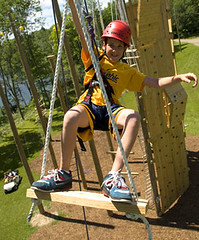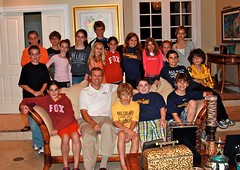 We are proud of our ‘no tech’ policy at camp. It allows our campers and staff to focus what’s important – the interactions with each other that can only happen at camp. That said, tech is certainly not all bad.
We are proud of our ‘no tech’ policy at camp. It allows our campers and staff to focus what’s important – the interactions with each other that can only happen at camp. That said, tech is certainly not all bad.
Believe it or not, camp doesn’t end with the buses heading home on August 10th. Sure, there won’t be 300 Weequahic maniacs enjoying Olympics, roasting marshmallows, or singing (shouting, really) songs for another 10 months in Lakewood, PA. But, thanks to modern tech, the Weequahic community continues to thrive throughout the year.
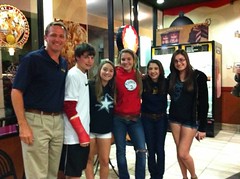 I’ve just enjoyed four reunions in Florida (Hollywood, Palm Beach Gardens, Orlando, and Boca). As I type this out, I’m on a plane headed to Los Angeles, CA to have a reunion and meet new families. We’ve got more get togethers coming up in New York and New Jersey soon as well.
I’ve just enjoyed four reunions in Florida (Hollywood, Palm Beach Gardens, Orlando, and Boca). As I type this out, I’m on a plane headed to Los Angeles, CA to have a reunion and meet new families. We’ve got more get togethers coming up in New York and New Jersey soon as well.
The phone has certainly been useful in getting these events up and running but the internet has really made it easier. We’ve started to build a thriving Facebook community with parents and our older campers. Twitter has also been useful, especially when I visit areas around the country. This blog is helpful in spreading the major messages of Weequahic: gratitude, courage, and great staff, among others.
The get togethers are certainly not just ‘camp created.’ I often hear of our younger campers getting together with others in the local area for playdays. Some are even teammates on soccer teams. At the Boca Raton ice cream reunion, I heard all about the plans of some of New Jersey and New York campers to come down to visit south Florida. One of our Boca Raton CITs is actually heading up to NY in December (and I don’t think it’s to see the snow….)
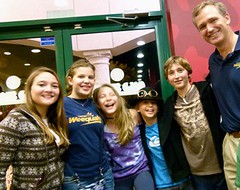 A final way we keep campers, parents and staff up to date with news from their friends is through our newsletters. We collect a lot of great information – such as Miss Katz making it to the cheerleading national championships a few weeks ago! Keep an eye out for the next one in January, everyone. (And keep us posted with news!!)
A final way we keep campers, parents and staff up to date with news from their friends is through our newsletters. We collect a lot of great information – such as Miss Katz making it to the cheerleading national championships a few weeks ago! Keep an eye out for the next one in January, everyone. (And keep us posted with news!!)
We do everything we can to keep our community tight, exciting, engaging, and fun throughout the year. Thankfully, with a great collection of nice kids from all over the planet (and a little help from technology), it’s easier to do than ever before. See you next summer!
Cole Kelly, Camp Director

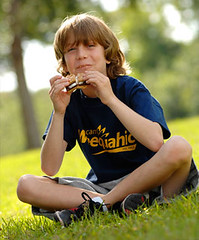 How would you describe the essential elements of a summer camp? Do the adventures of spending days with peers, learning new skills, trying new activities, bonfires and skits, great counselors— all the fun of the whole experience— first come to mind? These are definitely important elements of summer camp from a camper’s perspective, but there are a lot of other elements that have to be in place for a camp to be successful year after year. Have you ever wondered what it takes to set the scene and develop communities where good times can take place? I have.
How would you describe the essential elements of a summer camp? Do the adventures of spending days with peers, learning new skills, trying new activities, bonfires and skits, great counselors— all the fun of the whole experience— first come to mind? These are definitely important elements of summer camp from a camper’s perspective, but there are a lot of other elements that have to be in place for a camp to be successful year after year. Have you ever wondered what it takes to set the scene and develop communities where good times can take place? I have.
 The staff at Camp Weequahic works all year to make sure that facilities are maintained and prepared for when camp is in session. There are so many details to take care of— from making sure that buildings are cared for, to improving camp facilities, adding or updating equipment and ensuring that health and safety codes are met. Camp owners and managers also have to
The staff at Camp Weequahic works all year to make sure that facilities are maintained and prepared for when camp is in session. There are so many details to take care of— from making sure that buildings are cared for, to improving camp facilities, adding or updating equipment and ensuring that health and safety codes are met. Camp owners and managers also have to 
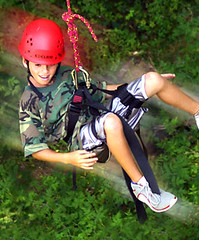 As children mature, they continue to develop and require more experiences where they can make independent choices without parents. If parents don’t allow children to make decisions and do things on their own, they won’t develop confidence or realize that they are not just extensions of their caregivers. It’s a tricky line that parents walk! Sometimes giving children room to spread their wings seems counter intuitive, but in order to grow into a self-reliant adult, children need to struggle without the offer of a quick fix. Even when parents can take care of things, the better choice is to support a child through the process of working through and solving problems. Long after a problem has been forgotten, a self-reliant child will remember hearing, “Wow! You amaze me! You really worked hard to figure that out.”
As children mature, they continue to develop and require more experiences where they can make independent choices without parents. If parents don’t allow children to make decisions and do things on their own, they won’t develop confidence or realize that they are not just extensions of their caregivers. It’s a tricky line that parents walk! Sometimes giving children room to spread their wings seems counter intuitive, but in order to grow into a self-reliant adult, children need to struggle without the offer of a quick fix. Even when parents can take care of things, the better choice is to support a child through the process of working through and solving problems. Long after a problem has been forgotten, a self-reliant child will remember hearing, “Wow! You amaze me! You really worked hard to figure that out.”